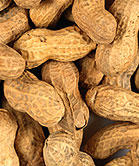Australian researchers say they may have come up with a potential treatment for peanut allergy that combines eating peanuts with a probiotic. More studies are needed and parents should not try this at home, the scientists say.
Probiotics are sometimes called “good bacteria” and are found in dietary supplements and in yogurt. They contain live bacteria and act as a way to “reset” the digestive system. The study took over 60 children between the ages of 1 and 10 and split them into two groups. About half got the treatment – in this case, a daily dose of a probiotic, as well as a small amount of peanut protein. That amount increased bit by bit over 18 months so that by the end of the study the children were eating 2 grams of peanuts every day. (That equals about a quarter of a tablespoon of peanut butter). The other half of the group, known as the control or placebo group, received neither peanut protein nor the probiotic.

The children eating the peanuts stopped eating them. They ate the peanuts again in a medical office at least two weeks after not having either the peanuts or the probiotic. Over 80% of children (23 of the 28 treated children) who received the probiotic/peanut treatment were still able to eat the peanuts.
This study is known as an oral immunotherapy study. In oral immunotherapy, you eat tiny but increasing amounts of something you are allergic to in the hopes that you can eventually force the body to accept it. Oral immunotherapy studies can be risky, leading to allergic reactions, which is why they are done under a doctor’s supervision. In this study, close to half of the children had reactions, ranging from minor reactions to more severe allergic reactions, including anaphylaxis. The study did not include children who had suffered severe allergic reactions to peanut in the past.
"This is an exciting study that offers a new twist on a potential treatment for food allergy,” said Dr. David Stukus, chair of the Kids With Food Allergies Medical Advisory Team. “Additional research is needed to better understand the risks and benefits, and especially to confirm if tolerance is maintained for longer periods of time. As exciting as this is, parents must be warned about the dangers of doing this on their own."
Given the allergic reactions of children during the study, Stukus, who is Assistant Professor of Pediatrics, Section of Allergy/Immunology at Nationwide Children's Hospital in Columbus, Ohio, also said more research is needed to determine who would make the best candidates to join future studies.
Researchers say the next step is to see if children are still able to eat peanuts after avoiding peanuts and the probiotic for two whole months. Typically, children who pass a peanut challenge are told to keep peanuts in the diet on a weekly basis. Otherwise, the allergy might return. Scientists want to see how long the protection of a probiotic will last. However, researchers do not know exactly how the probiotic works to keep someone from reacting to peanut.
This study is unique in that it is the first to include probiotics and peanuts with a control group. Results were published in a recent issue of the Journal of Allergy and Clinical Immunology.


Comments (11)